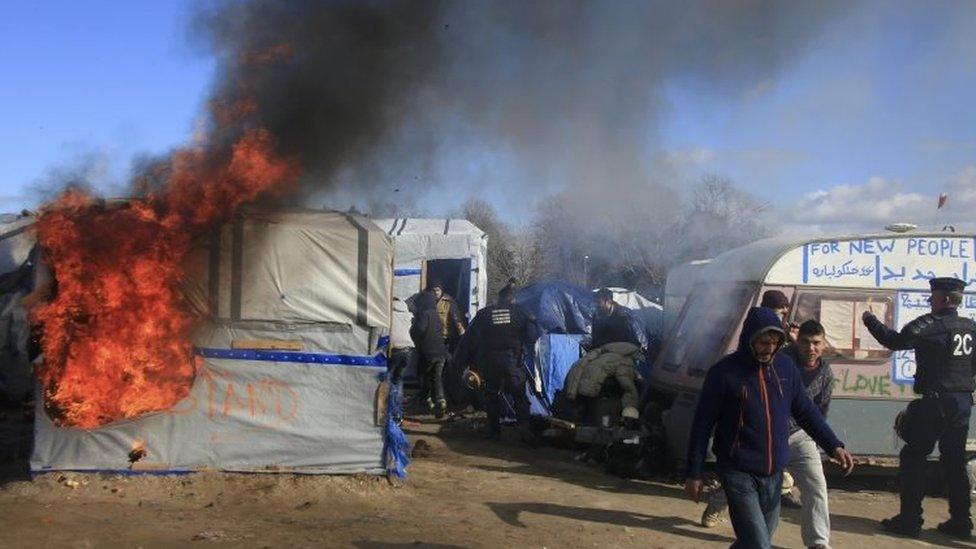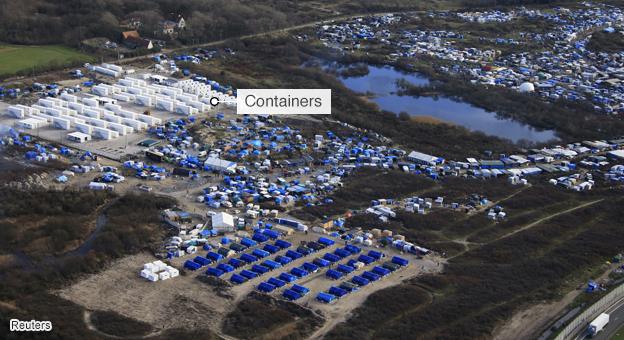EU migrant crisis: Clashes as France clears Calais 'Jungle'
- Published
Anna Holligan reports from the camp where teams have begun dismantling huts
Clashes broke out as demolition teams dismantled huts in part of a migrant camp known as the Jungle in the French port of Calais.
Riot police fired tear gas after migrants began throwing boulders inside the camp. At least 12 shacks were set ablaze, reports say.
The demolition teams appeared to leave inhabited huts intact as they move through the camp's southern sector.
The government plans to relocate migrants to reception centres.
Those living in the camp, mainly from the Middle East, Afghanistan and Africa, hope to cross the Channel, often using people traffickers to try to enter illegally.


One of the huts was on fire, and police used water canon to extinguish the blaze
At the scene: Anna Holligan, BBC News, Calais
Hidden by the cover of darkness, groups of migrants tried to access trucks on the motorway heading towards the port of Calais. Riot police fired tear gas, forcing them back.
On Monday the demolition squads moved through the Jungle. They were met by some resistance. A few migrants and protesters threw rocks in an effort to delay their eviction.
Little remains of the sprawling southern section of the settlement now.
The government is trying to encourage people to relocate to official accommodation provided inside converted shipping containers nearby. But most have refused the offer, fearing they'll be forced to claim asylum in France.
It's still unclear where the hundreds who've been evicted will go now.

They fear the changes mean they will be forced to give their fingerprints and claim asylum in France, dashing their dreams of reaching the UK.
The authorities believe some 1,000 migrants will be affected by the eviction plan while aid agencies say the number of people living there is much higher.
'Iron bars'
Clashes continued on Monday evening as groups of migrants fanned out across scrubland towards the motorway heading to the port of Calais, reports the BBC's Anna Holligan at the camp.
French media say about 150 people, some wielding iron bars, climbed onto the road to block vehicles.
Riot police pushed them back into the camp. Earlier water cannon were also used to extinguish a fire in the shacks at the camp.
About 100 homes were dismantled on Monday, with demolition teams expected to return the next morning, our correspondent says.
At least four people, including activists from the UK-based No Borders group, were arrested during the unrest, police say.
'No access'
Earlier Good Chance, a theatre group which works in the camp, said police were preventing volunteers from entering the camp.
"No volunteers access," it said in a tweet, external. "People removed from houses. Police blocking entry. This is what they call a 'soft demolition'."
Mouassa: "Instead of protecting me the government is going to destroy the place I'm living"
French officials say public areas in the camp such as places of worship or schools will not be affected and describe the clearance as a "humanitarian operation".
Conditions in the southern sector are squalid and the camp's sprawling presence has become a controversial issue in both France and the UK.

The Jungle in numbers

Total camp population is disputed - Calais officials say it houses 3,700, while Help Refugees puts it at 5,497
Figures for the southern half (facing immediate eviction threat) are estimated at either 800-1,000 or 3,455
There are 205 women and 651 children (423 unaccompanied), says Help Refugees
Local government's long-term aim is to have no more than 2,000 migrants living in Calais, says its chief, Fabienne Buccio

Officials say migrants can either move into heated container accommodation in the northern sector of the camp, where there is room for 1,500 people, move to similar accommodation centres elsewhere in France or claim asylum in France.
But many residents are reluctant to leave the Calais area.
"Going to Britain... is what people [here] want," Afghan migrant Hayat Sirat told AP. "So destroying part of the jungle is not the solution."

Containers have been built to house some of the migrants

The authorities want to clear a section of the south area of the camp